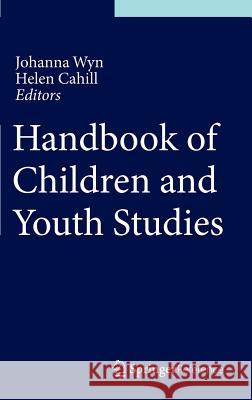Handbook of Children and Youth Studies » książka



Handbook of Children and Youth Studies
ISBN-13: 9789814451147 / Angielski / Twarda / 2015 / 927 str.
Handbook of Children and Youth Studies
ISBN-13: 9789814451147 / Angielski / Twarda / 2015 / 927 str.
(netto: 2187,86 VAT: 5%)
Najniższa cena z 30 dni: 2297,25 zł
ok. 20 dni roboczych.
Darmowa dostawa!
Challenging theoretical and conceptual orthodoxies, this book presents interdisciplinary thinking and critical perspectives on childhood and youth, to address the emerging consensus that boundaries between childhood, youth and adulthood are blurred.
Belonging (Section Introduction).- Indigenous Youth, Nationhood and the Politics of Belonging.- Belonging in Troubling Times: Considerations from the Vantage Point of Arab American Immigrant Youth.- Kids Like Us': Education and Belonging.- Strong Belonging in Poor Neighborhoods.- The Politics of Non-Belonging in the Developing World.- 'Let's Go 50/50'.- Girls' Embodied Experiences of Media Images.- Bodies in and out of Place: Schooling and the Production of Gender Identities through Embodied Experience.- Bodies: Bringing a Focus on Corporeality and Embodiment to Youth and Childhood Studies.- Theorizing Subjectivity and Feminine Embodiment: Feminist Approaches and Debates.- Citizenship: Inclusion and Exclusion.- Citizenship (Section Introduction).- Enhancing Citizen Engagement at the Municipal Level: Youth's Perspectives.- Participating as Young Citizens in Diverse Communities.- Turkana Pastoralist Children and Youth in Kenya: What Does CRC Mean to Them?.- Gender Identity and Generations of Change in Youth Studies.- Disrupting Disenabling Identities Through Drama.- Youth, Relationality, and Space: Conceptual Resources for Youth Studies from Critical Human Geography.- Stay or Go? Reading Identity Through Young People's Lives in Rural Places.- Thinking About the Future: Young People, Identity, and Class.- Getting to Precariat: Young People's Precarious Transition from School to Work, Japan's Case.- Young People and Employability.- Ordinary Working Lives and the 'Missing Middle'.- Unemployment, Insecurity, and Poor Work: Young Adults in the New Economy.- Young People's Transitions to Employment: Making Choices, Negotiating Constraints.- Learning from and with Young People in the Context of Social Problems in South Africa and Kenya.- “We Need to Talk about Learning”: Dialogue and Learning amongst South African Youth.- TBD 3.- Learning Gender in the Early Years of Schooling in South Africa.- Who's Learning or Whose Learning? Critical Perspectives on the Idea Youth-Led Policy-Making.- Related to Gender-Based Violence in a South African Classroom.- 'Black Neighbourhoods' and 'Race', Placed Identities in Youth Transition to Adulthoods.- Mobilities and Immobilities in the Creation of Contemporary Educational Inequalities.- Possibilities for Learning Between Childhoods and Youth in the Minority and Majority Worlds: Youth Transitions as an Example of Cross-World Dialogue.- Space and Place in Studies of Childhood and Youth.- Storing Our Lives of Now: The Pluritemporal Memories of Rural Youth Identity and Place.- Play (Section Introduction).- Serious Play: Youth and the Deployment of Culturally Subversive Sign Within Postmodern Capitalism.- Young People and Mobile Phone Technology in Botswana.- Young People, Online Gaming Culture and Education.- Youth, Consumption and Creativity on Australia's Gold Coast.- Current Debates in Social Justice.- Indigenous Girls, Social Justice and Schooling: Addressing Issues of Disadvantage.- The Role of Place in the Reproduction of Social Inequalities for Young People in India and Ethiopia.- The Youth Experience of Social Inequality: Class, Gender, and Urban Space in Mexico City.- Young People and Social Class in the United Kingdom.- Belief, Not Religion: Youth Negotiations of Religious Identity in Canada.- Koorlungka koorliny Noongar kaitijin kura, yeye boorda: Indigenous Young People and Spirituality.- Spirituality, Religion, and Youth.- Young People and Religion and Spirituality in Europe: A Complex Picture.- Youth and Religion in the Asia-Pacific.- Deconstructing Discourses to Rupture Fairy tales of the 'Ideal' Childhood.- The Promises of Empowered Girls.- Thinking about Childhood and Youth.- Thinking about Children: How Does it Influence Policy and Practice?.- Youth as a Social Phenomenon.- Critical Moments? The Importance of Timing in Young People's Narratives of Transition.- Juvenile Chronotopes: Space, Time, and Youth.- Rhythms and Flow: Timing and Spacing the Everyday.- Scale in Childhood and Youth Studies.- Time and Space in Youth Studies.- Reconsidering Youth Well-Being as Fluid and Relational: A Dynamic Process at the Intersection of Their Physical and Social Geographies.- Responding Effectively to Support the Mental Health and Well-Being of Young People.- Approaches to Understanding Youth Wellbeing.- Protecting and Promoting Young People’s Social and Emotional Health in Online and Offline Contexts.- Young People, Pleasure, and the Normalization of Pornography: Sexual Health and Well-Being in a Time of Proliferation.
Professor Johanna Wyn is director of the Youth Research Centre, University of Melbourne, in Australia. She specializes in longitudinal research on young people, documenting their transitions across the dimensions of education, work, well-being, relationships and family life. Prof. Wyn’s research is policy-focused and she is interested in developing new research and policy approaches to chronic patterns of disadvantage amongst youth. Her other areas of interest include gender, social policy and identity.
Associate Professor Helen Cahill is the deputy director of the Youth Research Centre, University of Melbourne, in Australia. She teaches in the Master of Education and the Master of Teaching programs, coordinating subjects which address youth well-being. Associate Prof. Cahill specializes in the use of participatory methods in research, education and community development projects and has a special interest in the use of drama as a tool in participatory research and transformative education and in projects which position young people as active agents.
1997-2024 DolnySlask.com Agencja Internetowa
KrainaKsiazek.PL - Księgarnia Internetowa









